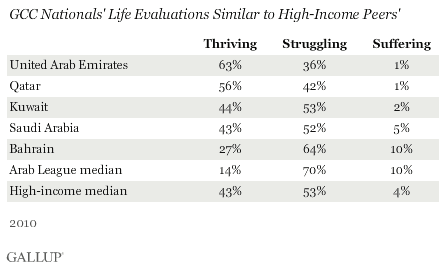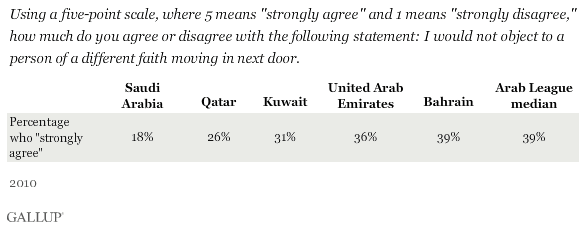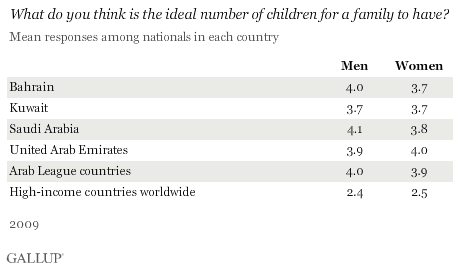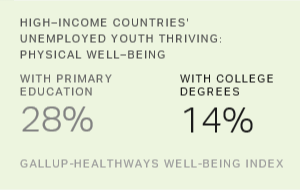WASHINGTON, D.C. -- Nationals in five Gulf Cooperation Council (GCC) countries rate their lives more positively than residents in other Arab states, according to a new report from the Abu Dhabi Gallup Center. The median 44% of GCC nationals who evaluate their lives well enough to be considered "thriving" is more similar to the median 43% thriving in 35 high-income countries around the world.

The report, Progress and Tradition in the Gulf Cooperation Council States, is an in-depth analysis of recent Gallup surveys conducted in GCC countries: Bahrain, Kuwait, Qatar, Saudi Arabia, and the United Arab Emirates. It offers an unprecedented look at the nationals' attitudes in some of the most dynamic and rapidly changing countries in the Middle East. The large expatriate populations found in many GCC countries were not included in the study.
The relatively high thriving percentages indicate nationals in most GCC countries positively rate their current lives and their lives five years in the future. Gallup asks respondents to rate each on a 0-to-10 ladder scale based on the Cantril Self-Anchoring Striving Scale and then classifies residents as either "thriving," "struggling," or "suffering."
Only Bahrainis rate their lives significantly worse than the median for 35 high-income countries worldwide. Slightly more than one in four Bahraini nationals (27%) are thriving, and a relatively high 10% are suffering. How people rate their lives is strongly related to how positively they feel about their financial situations. While about half of nationals in the United Arab Emirates (50%) and Qatar (51%) say they are living comfortably on their current income, 19% of nationals in Bahrain say the same.
Faith and Family Life Very Important to GCC Nationals
The report also highlights the importance of faith and family -- the two aspects of life that GCC nationals were most likely to consider "essential," or something they "cannot live without." Sixty-one percent or more of nationals in Saudi Arabia, Bahrain, Qatar, and the United Arab Emirates agree that "having an enriched religious/spiritual life" is essential. By comparison, the median figure among all Arab League countries is 52%. In the four GCC countries where the question was asked, most nationals also strongly agreed with the statement, "My faith is involved in every aspect of my life."
However, many GCC nationals may be uncomfortable with the growing religious diversity in their countries. In Saudi Arabia, Qatar, and Kuwait, less than one-third "strongly agree" that they would not object to having someone of a different religious faith move in next door -- significantly below the median for Arab League countries. In some cases, GCC nationals' preference for religious homogeneity may reflect a sense of being outnumbered by their countries' large expatriate populations.

"Having a family" is the aspect of life most commonly seen as essential in Kuwait; it is just as likely as "having an enriched religious/spiritual life" to be seen as essential in the United Arab Emirates and Bahrain, and it runs a close second to spiritual life in Saudi Arabia and Qatar. That strong family orientation is reflected in the finding that, on average, men and women in GCC countries say the ideal number of children for a family is about four.

This preference for relatively large families makes the GCC region an exception to the general rule that high-income countries with well-educated citizens tend to have relatively low fertility rates (among 35 high-income countries worldwide, residents' ideal number of children is about 2.5 on average). It also highlights the importance of job growth in GCC countries, forecasting the presence of large youth populations for years to come.
Implications
The findings presented in Progress and Tradition in the Gulf Cooperation Council States describe a region in which nationals enjoy a high standard of living and rate their lives accordingly. However, the report also offers insight into the challenges facing the region, particularly the need for jobs in countries where access to education has rapidly expanded and the average desired family size remains high. Efforts to promote economic diversification and job growth in GCC countries will require innovation and resourcefulness from all corners of society.
For complete data sets or custom research from the more than 150 countries Gallup continually surveys, please contact SocialandEconomicAnalysis@gallup.com or call 202.715.3030.
Survey Methods
Results from the GCC region are based on four face-to-face and telephone surveys conducted in 2009 and 2010 with approximately 1,000 adults, aged 15 and older. For results based on the total samples in each country, one can say with 95% confidence that the maximum margin of sampling error ranges from ±3.3 percentage points to ±3.7 percentage points. The margin of error reflects the influence of data weighting. In addition to sampling error, question wording and practical difficulties in conducting surveys can introduce error or bias into the findings of public opinion polls.
Because of the diversity and complexity of the populations in the GCC, this study does not include non-Arab expatriates. There are several barriers to accessing this community, including language and physical barriers to some expatriate communities.
Median results for the Arab League are based on surveys conducted in 20 Arab countries in the Middle East and North Africa. Median results for high-income countries are based on surveys conducted in 35 countries with high per-capita GDPs worldwide.
